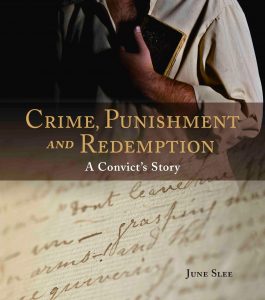- Author
- Book reviewer
- Subjects
- Book reviews, Biographies
- Tags
-
- RAN Ships
- None noted.
- Publication
- December 2014 edition of the Naval Historical Review (all rights reserved)
Crime, Punishment and Redemption – A Convict’s Story. By June Slee. National Library of Australia Publishing, Canberra, 2014. Landscape sized softcover of 207 pages, liberally illustrated with coloured prints, rrp $44.99.
During research for a doctoral thesis the author discovered the transcript of a 19th century diary by John Ward. Ward was one of thousands of English convicts sentenced to transportation in New South Wales; what is remarkable about him was that he was literate and maintained a diary during a period of his imprisonment, and that the record has survived. This provides a contemporary account of conditions experienced by prisoners when first incarcerated, their transfer to prison hulks and subsequent passage to Botany Bay and finally life in harsh colonial surroundings.
While other records of this time have been maintained by ex-convicts these have usually been by men from the professional classes who had fallen on hard times. With their skills they were employed within the colonial administration and readily became emancipated. As they had benefitted they were unlikely to be critical of the regime.
What has this do with naval history? Looking beyond the page we find two prominent characters, both men from Scottish Presbyterian backgrounds with strong moral outlooks. They had performed well in their naval service but the peace of the early 1800s found them on half-pay. Dr Alexander Nisbet was a naval surgeon who gained employment as surgeon-superintendent on a total of seven convict ships and was well known for his strict but compassionate treatment of prisoners. After many months in the prison hulk Yorkin Portsmouth harbour John Ward was at last taken with 290 other male prisoners to the transport Mangleswhere Dr Nisbet surveyed his charges. Here at last was a father figure that Ward could respect, in his rebellious life which had been dominated by his mother. Before retirement Alexander Nisbet was made the Royal Navy’s inspector of hospitals, became an honorary physician to Queen Victoria and received a knighthood.
When Mangles arrives at Port Jackson in 1840 the colony was ending the transportation system. Accordingly the convicts were sent to join others on Norfolk Island. Here Ward finds a new mentor, Captain Alexander Maconochie, RN, superintendent of the penal settlement. Maconochie was a founder of the Royal Geographical Society and the first professor of geography at University College London. In 1836 he became secretary to his friend the famous Arctic explorer Rear Admiral Sir John Franklin when taking up his appointment as Lieutenant-Governor of Van Diemen’s Land.
Ward benefitted from Maconochie’s enlightened system of penal reform where industry and good behaviour was rewarded. A library and educational facilities were established and a new chapel built, here Ward was given writing materials in the form of a Royal Naval Ship Store Book which became his diary.
As his composition appears free and uncensored this provides the author with material to reconstruct Ward’s life from an indulged childhood and following his father into service on a landed estate. Here, despite a kind master, he imitates some of the worse aspects of idleness in drunkenness, gambling and debauchery. In a tragedy of almost Shakespearean proportions Ward becomes enamoured with Rosamond (Rose) but his parents forbid the association leading to the youngster’s despair, downfall and eventual goaling for theft when aged 24.

The tragedy ends as Ward completes his penal servitude in Van Diemen’s Land; debilitated by ill health he is granted his ticket of leave in 1846. He then reflects upon his past and finds solace within the scriptures. It is most likely that he died of consumption at the Brickfield’s Pauper Establishment in 1871 when aged 56.
This book is a reminder of a grim chapter in our colonial past which is skilfully written with a featherweight pen that should appeal to a wide audience including history teachers and those seeking a better understanding of these times.
Reviewed by Arcturus




